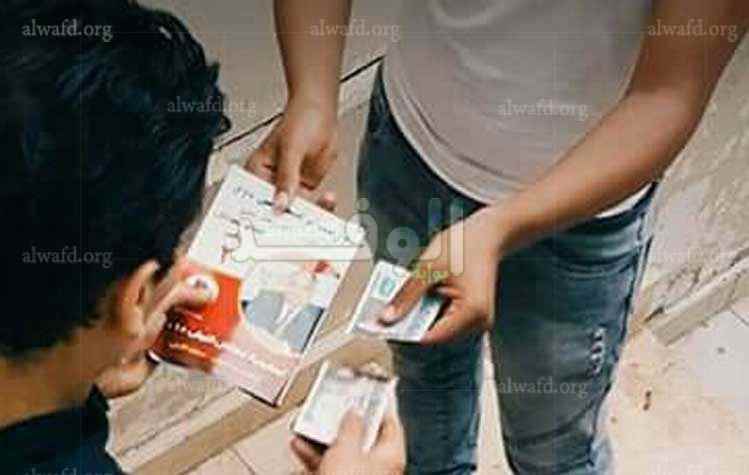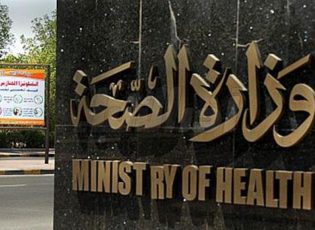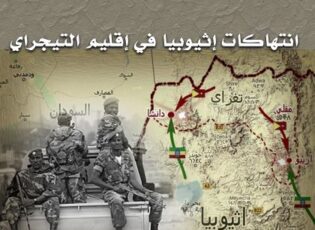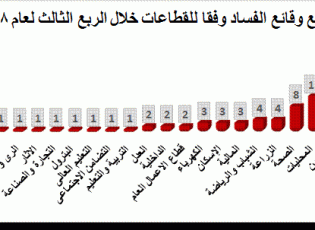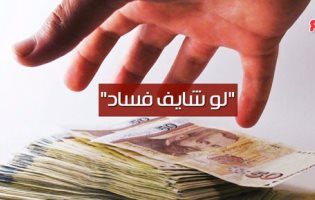The first report to assess electoral financing and spending in the second phase of the parliamentary elections
Lack of transparency is the behavior of the vast majority of candidates in the constituencies under observation
Personal resources are the source of funding for the campaigns of the vast majority of candidates and the poor refrain
Smoothing
Started Partners for transparency PFT In implementing its initiative to monitor electoral financing and spending in a number of electoral districts, which was titled “ Our voices are facing your money ”, Since September 2015, and the initiative will continue until the end of the second phase of the parliamentary elections in December 2015.
The initiative aims to come up with general indicators about the nature of electoral financing and spending in the Egyptian elections, and to establish new, scalable tools that can be used extensively later to help civil society organizations, the National Elections Authority, the media and parties to monitor, control and regulate the use of money in the electoral process.
This “preliminary” report deals with a quantitative analysis of the findings of field monitoring carried out by the Initiative team "Our Voices Against Your Money" In three electoral districts in the governorates of the second phase of the parliamentary elections, the first round of which was held on November 22 and 23, namely, the eastern districts in Port Said, Maadi in Cairo, Bandar Al-Mansoura in Dakahlia.
Partners for Transparency had issued an analytical report for the first phase that dealt with two constituencies of the constituencies targeted by the follow-up process, and for the current report, it includes an improvement on the report of the first phase, which is the presentation of the most important violations and observations that were monitored during the follow-up of the propaganda process, and also during the polling days. It is related to electoral financing and spending.
The monitoring process relied on collecting information from various sources, the most important of which is communicating with the candidate or one of his electoral campaign members, as well as monitoring the manifestations and activities of the electoral campaign for each candidate, in addition to collecting field certificates from voters registered in the electoral district.
First: About the electoral districts:
Maadi Department:
Constituency No. 19, based in the Maadi Division, includes both Maadi and Tora Division. It has one electoral seat in the next House of Representatives. Its voters number about 300 votes. The constituency witnessed 23 candidates competing between 5 party candidates, 18 independent candidates, and among the most prominent Candidates in the constituency (Hussein Megawer, deputy constituency for the National Party before the January 25 Revolution, Hafez Abu Saada, member of the National Council for Human Rights and candidate for the Conservative Party, and Zakaria Nassif, former Al-Ahly player and candidate for the Free Egyptians Party, "was excluded by the Supreme Elections Committee before Conducting the first round of the second phase of the parliamentary elections, ”in addition to Sharif Al-Secretary, a member of the local council in the district who ran in my round (2005-2011).
East Department of Port Said
Constituency No. 1, based in the First Division of Port Fouad, includes the first and second divisions of Port Fouad, Sharq al-Tafra'a, al-Sharq, and al-Arab. It has one electoral seat in the House of Representatives, and the constituency includes 31 candidates to win the electoral seat, divided between 24 independent candidates, and 7 party candidates And among the most prominent candidates in the constituency is Abd al-Rahman Basala, the Wafd candidate, “Eng. Amina Al-Omari,” “Dr. Mahmoud Hegazy, Secretary of the Nour Party in Port Said,” “Mahmoud Hussein,” the candidate of the Nation’s Future Party, “Bayoumi Al-Masry,” the candidate of the Free Egyptians Party. .
Mansoura city district:
District No. 1, based in the Mansoura Division, includes both the first and second sections of Mansoura. It has 3 seats in the next parliament, and the district includes 53 candidates to win the three seats in the parliamentary elections, divided between 8 party candidates, 45 independent individual candidates, and among the most prominent candidates In the circle, “Nabil El-Gamal,” the lawyer in the cassation, is Major General “Salah Samak”, “Muhammad Rashad,” “Jaco Samuel,” “Nabil Abu Warda,” “Ahmed Hammad,” “Enas Ibrahim Metwally,” the Free Egyptians Party candidate, “Awad al-Shibh”. The candidate of the Watan Future Party, “Numan Samir” is a young journalist and director of the office of Al-Shorouk newspaper in Dakahlia.
Second: The most important violations during the electoral campaign period:
First: Maadi Department in Cairo Governorate:
- November 7: The Nineteenth Constituency / Maadi District / The campaign of the candidate, Abdul Rahman Al-Sawy, hung banners in front of the educational administration building in Maadi (exploitation of government facilities)
- November 7: The Nineteenth Constituency / Maadi District / The campaign of the candidate Zakaria Nassif published a propaganda for him on the pictures of the Tora Al-Balad Elementary Institute Al-Azhari (the exploitation of his sons by the government)
- November 7: The Nineteenth District / Maadi District / The “Candidate Hussam Al-Rifai” and “Hatem Abdel-Hadi” campaign spread propaganda on the metro fences at Tora station (the exploitation of his two governmental buildings)
- November 7: The Nineteenth District / Maadi District / The campaign of the candidate Hussam Al-Rifai spread propaganda on the walls of the Al-Azhari Elementary Tora Institute (the exploitation of his government-owned buildings)
- November 9: The Nineteenth District / Maadi and Tora District / The campaign of the candidate Hussam Al-Rifai hung signs on the walls of the subway station in Maadi Gardens (exploitation of public facilities)
Second: the East Department in Port Said Governorate:
- November 1, 2015: The First Constituency / The East Department has its headquarters / First Division Port Fouad / Candidate Abd al-Rahman connected him to a meeting to put the finishing touches to the launch of his election campaign (early advertising)
- November 1, 2015: The First Constituency / The East Department has its headquarters / First Division Port Fouad /Candidate Ihab Dahi and Ahmed Abu Al-Majdou, Emad Ishaq, paid sponsored ads on the Jeel Al-Thawra newspaper website (Early Advertisement)
- November 2, 2015: The First District / the East Department has its headquarters / First Department Port Fouad / Candidate Mahmoud Rasmy hung propaganda banners for him (early propaganda)
- November 2, 2015: The First District / the East Department has its headquarters / First Department of Port Fouad / Candidate Ali Al-Feki held an election meeting in a café (early propaganda)
- November 11, 2015: The First District / the East Department has its headquarters / First Division Port Fouad/ Candidate Mahmoud Hussein affixed propaganda banners on the walls of the Great Mosque in Maadi Square (propaganda - the use of a religious facility)
- November 12, 2015: The First District / the East Department has its headquarters / First Department of Port Fouad/ Candidate Mahmoud Rasmi hung propaganda posters on the walls of the Court of Appeal in Port Fouad, and it is known that the court building was built from antiquity as it was the mixed court in the era of the British occupation (propaganda - the exploitation of a facility)
- November 14, 2015: The First District / the East Department has its headquarters / First Department of Port Fouad / Candidate Emad Ishaq published photos of himself with the priest Salib and Sheikh Ibrahim Lotfi (propaganda - exploitation of clerics)
Third: Mansoura city district:
- Sunday November 1, 2015: District One / Mansoura City District / Mansoura first and second department / Candidate Numan Samir held a session with some of the people of Palm Street to present his electoral program. (Early propaganda)
- Monday, November 2, 2015: The First District / Mansoura City District / Mansoura first and second department / "Candidate Jaco Samuel Gerges" presented his electoral program through his personal page on the social networking site Facebook. (Early election propaganda)
- Saturday November 7, 2015: District One / Mansoura City District / Mansoura first and second department / “Candidate Numan Samir” held a session at the Nile Club with some of the circle’s youth. The session was attended by Rida al-Gharabawi, the head of the Peasants ’Syndicate, who announced his support for the candidate.
- Saturday November 7, 2015: District One / Mansoura City District / Mansoura first and second department/ “Candidate Lotfi Mohamed Lotfy,” used sweepers to draw water from the streets, which were caused by heavy rain (electoral bribes).
- Friday, November 13, 2015: The First District / Mansoura City District / Mansoura first and second department/ The “candidate, Nabil El-Gamal,” held a session within the Bar Association to present his election program to the members of the bar. (Exploiting trade union facilities)
Third: The most important electoral offenses on polling days:
First: Mansoura city district in Dakahlia:
- Dakahlia Governorate / Al-Mansoura District / Al-Zahzia School/ Supporters of “Candidate Nabil El-Gamal” influence the voters in front of the polling station to vote for their candidate, at 11:30 pm.
- Dakahlia Governorate / Mansoura District / Al-Ayoubi Girls School / Supporters of “Candidate Wahid Fouda” hired 4 thugs to influence the voters in front of the polling station to choose their candidate, at 12:00 noon.
- Dakahlia Governorate / Mansoura District / Jad Al-Haq Preparatory School / Supporters of “Candidate Wahid Fouda” direct the voters in front of the polling station in favor of their candidate at 1 pm.
- Dakahlia Governorate / Mansoura District / Al-Malek Al-Kamel School / Candidate Mohamed El Gohary influences the voters to choose him by accompanying them inside the committees, at exactly 7:55 pm.
- Dakahlia Governorate / Mansoura District / Gulangil Primary School / Supporters of the candidates (Mohamed Rashad, Wahid Fouda, Awad Al-Sabq) distributed sums of money to the voters in front of the polling station to urge the voters to choose their candidates, at 10:30 in the morning.
- Dakahlia Governorate / Mansoura District / Gulangil School / The “Candidate Muhammad Al-Barbari” and his supporters direct the voters in front of the polling station for his selection.
- Dakahlia Governorate / Mansoura District / Gulangil School / Nour Party supporters direct women voters to choose their list in front of the polling station.
- Dakahlia Governorate / Mansoura District / Gulangil School / Supporters of the candidates (Muhammad al-Barbari, Ahmad Salama al-Sharqawi), gather the voters at your tactics and then accompany them to the polling station to select their candidates, at exactly 12 noon
- Dakahlia Governorate / Mansoura District / Military School for Boys/ The “Candidate Hisham Al-Dawoudi” directs the voters in front of the polling station to choose him.
- Dakahlia Governorate / Mansoura District / Al Zahraa School/ The supporters of “Candidate Muhammad Rashad Ghoneim,” paying voters near the polling station to choose their candidate.
Second: East Department in Port Said Governorate:
- Port Said Governorate / Eastern District / Al-Qana Elementary School / Candidate Mahmoud Hussein brought a bus to transport voters to the committees
- Port Said Governorate / Eastern District / Port Fouad Youth Center / Reports about delegates of "Candidate Mahmoud Hussein", the candidate of the Future of Watan Party, distributing sums of money in the amount of 300 pounds to the electoral vote.
Third: the Maadi Department in Cairo Governorate:
- Cairo / Maadi / Maadi Secondary School for Boys,The presence of cars to transport voters and electoral propaganda for the list in Love for Egypt by Akmal Kartam
- Cairo / Maadi / Hadayek El Maadi Experimental School /Running angel cars with election propaganda for the Independence Movement in the vicinity of the district.
Fourth: Results of monitoring financial spending
East Department of Port Said:
First: Information provided by the candidate or his election campaign officials:
This part is based on information provided by the candidate himself or one of his election campaign officials, and it is calculated for the candidates of the East District in Port Said that they were more open to observers, and most of them made statements, and according to what they decided on their own (which we could not infer with tangible evidence other than the candidate’s statement). All of the candidates had records to record accounts, and 97% of them had the assistance of a chartered accountant, as for donations, the vast majority of them did not receive cash or in-kind donations (97%, 87%), and the 77% of them were personal resources as the main source of financing his election campaign.
|
Information provided by the candidate |
Candidate position |
||
| Yeah | No |
He refused to answer |
|
| Having a regular record of accounting |
30 |
0 |
1 |
| Receive cash donations |
1 |
29 |
1 |
| Receive in-kind donations |
4 |
26 |
1 |
| The presence of a registered accountant preparing financial reports |
29 |
1 |
1 |
The main source of financing for the election campaign
|
Personal resources |
Other resources such as parties |
| 23 |
7 |
Second: Prohibited electoral financing:
The data of the following table indicate, that about 19% of the East Department candidates practiced early publicity for the specified legal period, and 6% of them used houses of worship in propaganda, and the same percentage used government facilities, while only 3% used civil organizations in the advertising process.
|
Banned electoral financing |
Candidate position | |
| Yeah |
No |
|
| Practicing advertising prior to the legal period |
6 |
25 |
| Use of places of worship |
2 |
29 |
| The use of community organizations |
1 |
30 |
| Use of government facilities |
2 |
29 |
Third: Prohibited electoral spending
The data of the following table indicates that 3% candidates in the Sharq district in Port Said bribed voters in material or in kind form or promised to provide this bribe, while the 97% did not commit this violation.
|
Banned electoral financing |
Candidate position | |
| Yeah |
No |
|
| Distributing bribes |
1 |
29 |
| Distributing bribes in kind |
1 |
30 |
|
He promised to distribute financial or in-kind bribes |
1 |
30 |
Fourth: Transparency of Electoral Funding and Expenditure:
This axis is considered the most negative for the candidates of the East Department in Port Said, as all the candidates (100%) did not announce their bank account number, their campaign financing sources, or the size of their electoral spending.
|
Transparency of electoral financing and spending |
Candidate position | |
| Yeah |
No |
|
| Announcing the bank account number |
0 |
31 |
|
Announcing the sources of financing the election campaign |
0 |
31 |
| Declare the size of the electoral spending |
0 |
31 |
Mansoura city district in Dakahlia:
The monitoring process in this department included 39 candidates, while the rest of the candidates could not be reached
First: Information provided by the candidate or his election campaign officials:
This part is based on information provided by the candidate himself or one of his election campaign officials. Many candidates from Bandar Mansoura district refused to answer their questions, and according to what some candidates decided to answer (which we could not infer with concrete evidence other than the candidate’s statement. 1) Only 26 % candidates had records for recording accounts, 31 % candidates had no records to record accounts, while 43 % candidates refused to answer the question, 26 % candidates did not use a chartered accountant, and the rest of the 74 % 74 candidates refused to answer On the question, regarding donations, 28 % candidates did not receive cash donations, the remaining 72 % 72 candidates refused to answer the question, 13 % 1T candidates received in-kind donations, 15 % candidates did not receive in-kind donations, while 72 % candidates refused to answer Question, as the % 92 of the candidates were personal resources as the main source of financing his election campaign.
|
Information provided by the candidate |
Candidate position | ||
| Yeah | No |
Declined to answer |
|
|
Having a regular record of accounting |
10 | 12 |
17 |
| Receive cash donations |
0 |
11 |
28 |
|
Receive in-kind donations |
5 | 6 |
28 |
| The presence of a registered accountant preparing financial reports |
0 |
10 |
29 |
The main source of financing for the election campaign
|
Personal resources |
Other resources such as parties |
| 36 |
3 |
Second: Prohibited electoral financing:
The data of the following table indicate that about 36% candidates from Bandar Al-Mansoura constituency practiced early publicity for the specified legal period, and 3 % of them used houses of worship in publicity, and the same percentage used civil organizations, while 10 % used government facilities in the advertising process .
|
Banned electoral financing |
Candidate position | ||
| Yeah | No |
|
|
| Practicing advertising prior to the legal period |
14 |
25 |
|
| Use of places of worship |
1 |
38 |
|
|
The use of community organizations |
1 |
38 |
|
| Use of government facilities |
4 |
35 |
|
Third: Prohibited electoral spending
The data of the following table indicate that there are 13 % candidates in Bandar Al Mansoura district who bribed the voters in material form, while 8 % of the candidates provided in-kind bribes, while 13 % candidates made promises to distribute financial or in-kind bribes.
|
Banned electoral financing |
Candidate position | |
| Yeah |
No |
|
| Distributing bribes |
5 |
34 |
| Distributing bribes in kind |
3 |
36 |
| He promised to distribute financial or in-kind bribes |
5 |
34 |
Fourth: Transparency of Electoral Funding and Expenditure:
This axis is considered the most negative for candidates from Bandar Al-Mansoura constituency, as all the candidates (100%) did not announce their bank account number, while 2.5 % of the candidates announced the sources of campaign financing, and none of the candidates announced the size of the electoral spending.
|
Transparency of electoral financing and spending |
Candidate position | |
| Yeah |
No |
|
|
Announcing the bank account number |
0 |
39 |
| Announcing the sources of financing the election campaign |
1 |
38 |
| Declare the size of the electoral spending |
0 |
39 |
Maadi City Department in Cairo:
The monitoring process included 20 candidates, while no complete information was reached on two of the candidates
First: Information provided by the candidate or his election campaign officials:
This part is based on information provided by the candidate himself or one of his election campaign officials, and according to what the candidates decided to answer in the Maadi district (which we could not infer with concrete evidence other than the candidate’s statement), only 15 % of the candidates have records to record accounts, and 45 % of the candidates did not have records to record accounts, while 40 % candidates refused to answer the question, 10 % candidates used a chartered accountant in their election campaigns, while 50% candidates did not use a chartered accountant, and 40 % candidates refused to answer the question As for donations, 45 % candidates received material donations, 15 % did not receive cash donations, 40 % candidates refused to answer the question, 10 % candidates received in-kind donations, 50 % candidates did not receive in-kind donations, 40 rejected % of candidates answered the question, and 60 % of candidates were the main source of funding for their election campaign, and 40 of them % were other resources to finance their election campaigns.
|
Information provided by the candidate |
Candidate position | ||
| Yeah | No |
Declined to answer |
|
| Having a regular record of accounting |
3 |
9 |
8 |
| Receive cash donations |
9 |
3 |
8 |
| Receive in-kind donations |
2 |
10 |
8 |
| The presence of a registered accountant preparing financial reports |
2 |
10 |
8 |
The main source of financing for the election campaign
|
Personal resources |
There is no answer |
| 12 |
8 |
Second: Prohibited electoral financing:
The data of the following table indicate, that about 45 % candidates from Maadi constituency practiced early publicity for the specified legal period, 15 of them % used houses of worship for propaganda, and 45 % candidates used civil organizations, while 20 % candidates used Government enterprises in the advertising process.
|
Banned electoral financing |
Candidate position | ||
| Yeah |
No |
||
|
Practicing advertising prior to the legal period |
9 |
11 |
|
|
Use of places of worship |
3 |
17 |
|
|
The use of community organizations |
9 |
11 |
|
| Use of government facilities |
4 |
16 |
|
Third: Prohibited electoral spending:
The following table data indicates that none of the Maadi candidates offered financial bribes to the voters, while 10 % candidates distributed in-kind bribes to citizens, and 5 % candidates made promises to distribute financial or in-kind bribes.
|
Banned electoral financing |
Candidate position | ||
| Yeah |
No |
||
| Distributing bribes |
0 |
20 |
|
|
Distributing bribes in kind |
2 |
18 |
|
|
He promised to distribute financial or in-kind bribes |
1 |
19 |
|
Fourth: Transparency of Electoral Funding and Expenditure:
This axis is considered the most negative for Maadi candidates, as all the candidates (100%) did not announce their bank account number, while 5 % of the candidates announced the sources of campaign financing, and none of the candidates announced the size of the electoral spending.
|
Transparency of electoral financing and spending |
Candidate position | ||
| Yeah |
No |
||
| Announcing the bank account number |
0 |
20 |
|
| Announcing the sources of financing the election campaign |
1 |
19 |
|
| Declare the size of the electoral spending |
0 |
20 |
|
Final conclusions
The results collected from three electoral districts in the governorates of Cairo, Port Said, and Dakahlia indicate the continuation of a number of negative practices that were monitored during the first phase, the most prominent of which is the absence of the element of transparency and disclosure among the overwhelming majority of the candidates, as all candidates - with rare exceptions - did not pay attention to the advertisement On the size of their electoral spending or the sources of financing their election campaign, although this is an inherent right of the voter.
With regard to the sources of campaign financing, the results showed that personal resources were the main source for the vast majority of candidates, which indicates that the rich were the most candidates, while the opportunities for the poor who did not have financial resources to enable them to spend on their election campaigns decreased, especially In light of the lack of opportunities to obtain support through political parties or legal donations.
The results also revealed that the candidates for the East Department in Port Said were the most responsive to the monitoring team, while the candidates for the Maadi Department in Cairo and Mansoura in Dakahlia were the least responsive, and the majority of them refused to make statements to the monitoring team.

